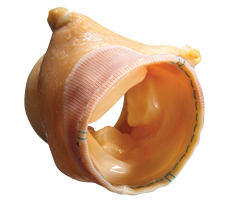“Why Are Pig Valve Replacements Still Used?” Asks Jim
By Adam Pick on March 26, 2012
I recently received a great question from Jim about pig valve replacements. He wrote to me, “Hi Adam – The pros and cons of tissue valves vs. mechanical valves are pretty clear. I don’t understand, however, why pig tissue valve replacements are still used. They came on the scene before cow valves. Pig valves can have sudden failure with resulting patient mortality. Cow valves last longer and deteriorate slowly and predictably. Why don’t surgeons quit using pig valves? Thanks, Jim”

Porcine Heart Valve Replacement Device
I wanted to provide Jim an expert response, so I contacted two very experienced heart valve surgeons — Dr. Harold Roberts and Dr. Juergen Ennker. Together, these surgeons have over 50 years of cardiac surgery experience.

Dr. Harold Roberts – Heart Valve Surgeon
Doctor Harold Roberts, cardiac surgeon, who practices at WVU Medicine in West Virginia, offered a helpful history of tissue valves and his personal preference for valve replacement selection in the aortic position:
The first tissue valves were pig. They generally lasted about 10 years. Bovine pericardial valves were first introduced in the early 80’s. The first model, the Ionesceau-Shiley was a disaster. However, Edwards’ Perimount model was much more durable. The 3rd generation model I exclusively use, the Magna, has excellent hemodynamics and durability. In general, I happen to agree with Jim regarding the superiority of bovine pericardial versus pig. I’ve nearly exclusively used bovine pericardial valves since I finished training in 1990. Since I rarely replace a mitral valve, most of these valves have been in the aortic position. The number of these valves that I’ve had to re-replace, I can easily count on one hand. Since most of these valves are implanted in patients at least 50 years of age, they generally function till the patient dies of another cause. Most of the available data indicate that the valve is good for 15-20 years. With the advent of percutaneous valve technology, failing bio-prostheses can often be replaced with a transcatheter solution. I hope this helps Jim, Dr. Roberts

Dr. Juergen Ennker – Heart Valve Surgeon
I also contacted Dr. Juergen Ennker, who practices in Lahr, Germany as the Chief of Cardiothoracic Surgery at the MediClin clinic near Frankfurt. Dr. Ennker also offered interesting insights specific to Jim’s question:
The durability of porcine vs pericardial tissue is an interesting question. Pericardial valves are manufactured out of bovine or equine tissue. Every tissue valve can experience a tissue tear, which is connected with sudden valve insufficiency. However, to my knowledge there are no hints in the literature, that porcine valves have a worse outcome compared to pericardial valves in general. Valve durability is influenced by many factors, as patient age, calcium metabolism, stress factors (blood pressure), valve technology (stentless, stented, sutureless) and so on.
Dr. Ennker also provided research to consider:
I found the following quotation in the literature, which may further comment on the question by Jim… It remains to be seen whether these newer generations of porcine valves will equal or exceed the results with pericardial valves. Nonetheless, the rates of explanation of pericardial aortic valve replacement in our series and others strongly suggest that the traditionally purported risk of a “50% chance of re-operation at 10 years” with porcine bioprostheses is no longer valid. Indeed, we as clinicians must re-evaluate and re-educate our peers and patients on the true risks and benefits of aortic valve replacement utilizing current bioprosthetic valve technology.
Thanks to Jim for his excellent question and a special thanks to Dr. Harold Roberts and Dr. Juergen Ennker for sharing their clinical expertise and research with our patient and caregiver community.
Keep on tickin!
Adam
|
Paul says on March 27th, 2012 at 2:41 pm |
|
Hi Adam, Paul |
 |
|
Tom Smeal says on April 11th, 2012 at 8:18 am |
|
Good question. I will be having aortic valve replacement surgery soon and I’m a very active person and concerned about stressing my heart after the operation. |
 |
|
Lief says on May 21st, 2012 at 3:50 pm |
|
Paul & Tom, |
 |
|
Linda Steagall says on September 30th, 2013 at 11:27 pm |
|
My fiancé had a pig valve replacement in 1968 or 1969 and he is now 47 years old. He hasn’t seen a doctor since he was 16 years old. He has had this valve for 45 years now. Is this normal? Is there anything we need to worry about? His health seems fine, I just want to make sure we’re not risking his life by not addressing his valve replacement surgery done so many years ago. He has no medical insurance. |
 |














